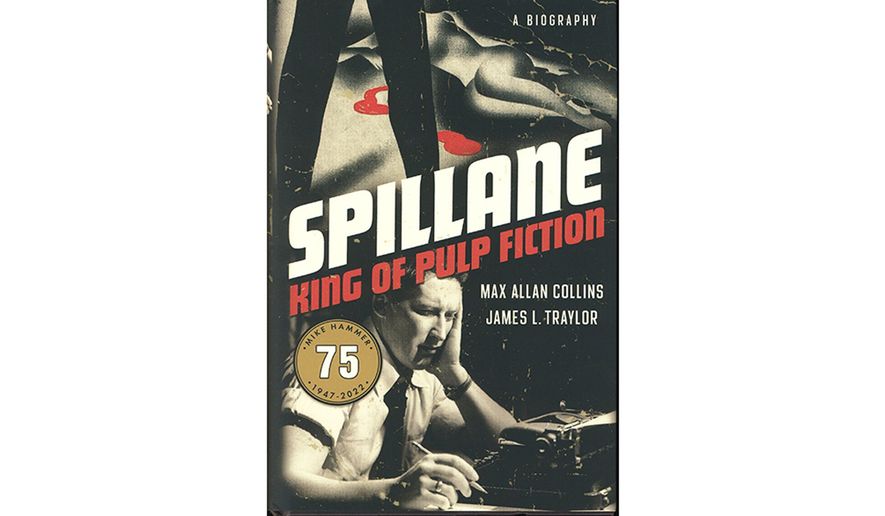OPINION:
I read “I, the Jury” when I was a preteen and was much taken with the bold crime novel, especially the shocking ending. Those early Mickey Spillane novels left an indelible impression on this crime aficionado.
Mickey Spillane was unabashedly conservative and unpretentious. Despite the terrible reviews he received during his life, he sold millions of copies of his books. He called his readers “customers” and said he was a writer and not an author.
Otto Penzler, the publisher of the Mysterious Press and editor of crime anthologies, told me that he was an admirer of Spillane’s. He noted that Ayn Rand was also an admirer and once compared Spillane’s and the late novelist Thomas Wolfe’s descriptions of a rainy night in New York. She much preferred Spillane’s brief but evocative description to Wolfe’s lengthy description, which ran for six pages.
Max Allan Collins and James L. Traynor have written a fine biography of the late writer, who died in 2006 at the age of 88. “Spillane: The King of Pulp Fiction” covers his fascinating life, from his upbringing and service as a pilot in World War II to his progression from comic book writer to best-selling crime novelist.
I contacted Max Allan Collins, one of the co-authors, and asked him why he and Mr. Traynor wrote a biography of Mickey Spillane.
“Spillane was the 20th Century’s bestselling American mystery writer — second, worldwide, only to Agatha Christie — and has never been the subject of a biography before. He is often mentioned only in a dismissive manner and deserved better,” Mr. Collins replied.
Mr. Collins, a Mystery Writers of America grand master, is the author of the Nathan Heller historical thrillers and the graphic novel “Road to Perdition,” which was the basis of the Academy Award-winning film. He knew Spillane and completed 13 posthumous Mickey Spillane novels.
How did Spillane influence crime fiction?
“His influence was huge in crime fiction, but it bled into other genres and the mainstream as well,” Mr. Collins said. “To the hardboiled mystery, he brought a new level of sex and violence, which connected with the post-WW 2 loss of innocence felt by former GIs. He uncovered a market that gave birth to paperback originals, though he appeared in hardcover before being reprinted in cheap editions. His hard-hitting, vigilante-style anti-hero, Mike Hammer, paved the way for every fictional tough protagonist thereafter, from James Bond to John Shaft, from the Girl with The Dragon Tattoo to Jack Reacher.”
How would you describe a typical Spillane novel?
“Structurally, the novels are typified by a startling opening chapter that thrusts the reader into the action and a closing chapter that is even more startling, both surprising and violent, with the ending abrupt. The narrative is usually in the first-person and, in another of his innovations in the genre, the conflict is a personal one, and the emotions of the lead character run hot.”
How did Spillane influence you as a crime writer?
“I was equally influenced by Dashiell Hammett, Raymond Chandler, and James M. Cain, the founding fathers of the noir school of fiction. Spillane was the king of the next generation, and from him, I learned the value of frank action and sex and putting real emotion on the page.”
What was it like to know Spillane personally?
“He was warm and funny and extremely unpretentious, very much down-to-earth. He was generous and, I think, hurt by the critical pummeling he received, which went beyond literary criticism into blame for everything from fomenting juvenile delinquency to making pornography mainstream. The truth is, his great love was language in the service of storytelling,” Mr. Collins explained.
What do you say to those who dismiss Spillane as a writer?
“Everybody has a right to an opinion, but too many who express opinions about Mickey’s work have either not read it or not read much of it. Take a look at his often-brilliant opening and closing chapters; study the ease with which Mike Hammer’s noir poetry rolls out of cynical lips dangling a Lucky Strike,” Mr. Collins said.
Do you think Spillane will continue to be read by crime fiction fans in the future?
“No question that the first six Mike Hammer novels will be read and enjoyed and studied,” Mr. Collins said. “It’s a bit of a pity that the first and most famous — I, the Jury — is probably the least of the early books. He got better and better, and his masterpiece is the surreal fever dream One Lonely Night, in which he answers his critics by way of a tommy-gun-wielding Mike Hammer.”
• Paul Davis’ On Crime column covers true crime, crime fiction and thrillers.
• • •
Spillane: King of Pulp Fiction
Max Allan Collins and James L. Traynor
Mysterious Press, $26.95, 400 pages




Please read our comment policy before commenting.